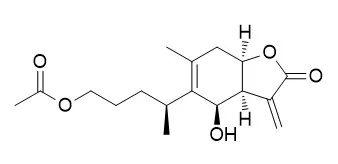| Kinase Assay: |
| PLoS One. 2016 Feb 10;11(2):e0148968. | | Acetylbritannilactone Modulates Vascular Endothelial Growth Factor Signaling and Regulates Angiogenesis in Endothelial Cells.[Pubmed: 26863518 ] | The present study was conducted to determine the effects of 1-O-Acetylbritannilactone (ABL), a compound extracted from Inula britannica L., on vascular endothelial growth factor (VEGF) signaling and angiogenesis in endothelial cells (ECs).
METHODS AND RESULTS:
We showed that ABL promotes VEGF-induced cell proliferation, growth, migration, and tube formation in cultured human ECs. Furthermore, the modulatory effect of ABL on VEGF-induced Akt, MAPK p42/44, and p38 phosphorylation, as well as on upstream VEGFR-2 phosphorylation, were associated with VEGF-dependent Matrigel angiogenesis in vivo. In addition, animals treated with ABL (26 mg/kg/day) recovered blood flow significantly earlier than control animals, suggesting that ABL affects ischemia-mediated angiogenesis and arteriogenesis in vivo. Finally, we demonstrated that ABL strongly reduced the levels of VEGFR-2 on the cell surface, enhanced VEGFR-2 endocytosis, which consistent with inhibited VE-cadherin, a negative regulator of VEGF signaling associated with VEGFR-2 complex formation, but did not alter VE-cadherin or VEGFR-2 expression in ECs.
CONCLUSIONS:
Our results suggest that ABL may serve as a novel therapeutic intervention for various cardiovascular diseases, including chronic ischemia, by regulating VEGF signaling and modulating angiogenesis. | | Eur J Pharmacol. 2007 Dec 22;577(1-3):28-34. | | Acetylbritannilactone suppresses lipopolysaccharide-induced vascular smooth muscle cell inflammatory response.[Pubmed: 17915214 ] | To investigate the mechanism of action by which a new anti-inflammatory active compound, 1-O-Acetylbritannilactone (ABL) isolated from Inula britannica-F., inhibits inflammatory responses in vascular smooth muscle cells (VSMCs).
METHODS AND RESULTS:
Enzyme immunoassay was used to measure the levels of prostandin E(2) (PGE(2)) production. Immunocytochemistry staining and Western blot analysis were performed to detect the nuclear translocation of nuclear factor-kappaB (NF-kappaB) p65 and the expression of IkappaB-alpha, pIkappaB-alpha and cyclooxygenase-2 (COX-2). Electrophoretic mobility shift assays (EMSA) were used to detect DNA-binding activity of NF-kappaB in VSMCs. ABL (5, 10, 20 micrommol/l) had several concentration-dependent effects, including inhibition of lipopolysaccharide (LPS)-induced PGE(2) production and COX-2 expression, and blockade of NF-kappaB activation and translocation. These effects were owing to reductions in IkappaB-alpha phosphorylation and degradation induced by LPS. In addition, ABL directly inhibited the binding of active NF-kappaB to specific DNA cis-element.
CONCLUSIONS:
These results indicate that ABL is a potent inhibitor of LPS-stimulated VSMC inflammatory responses through blockade of NF-kappaB activity and inhibition of inflammatory gene COX-2 expression. |
|






 Cell. 2018 Jan 11;172(1-2):249-261.e12. doi: 10.1016/j.cell.2017.12.019.IF=36.216(2019)
Cell. 2018 Jan 11;172(1-2):249-261.e12. doi: 10.1016/j.cell.2017.12.019.IF=36.216(2019) Cell Metab. 2020 Mar 3;31(3):534-548.e5. doi: 10.1016/j.cmet.2020.01.002.IF=22.415(2019)
Cell Metab. 2020 Mar 3;31(3):534-548.e5. doi: 10.1016/j.cmet.2020.01.002.IF=22.415(2019) Mol Cell. 2017 Nov 16;68(4):673-685.e6. doi: 10.1016/j.molcel.2017.10.022.IF=14.548(2019)
Mol Cell. 2017 Nov 16;68(4):673-685.e6. doi: 10.1016/j.molcel.2017.10.022.IF=14.548(2019)